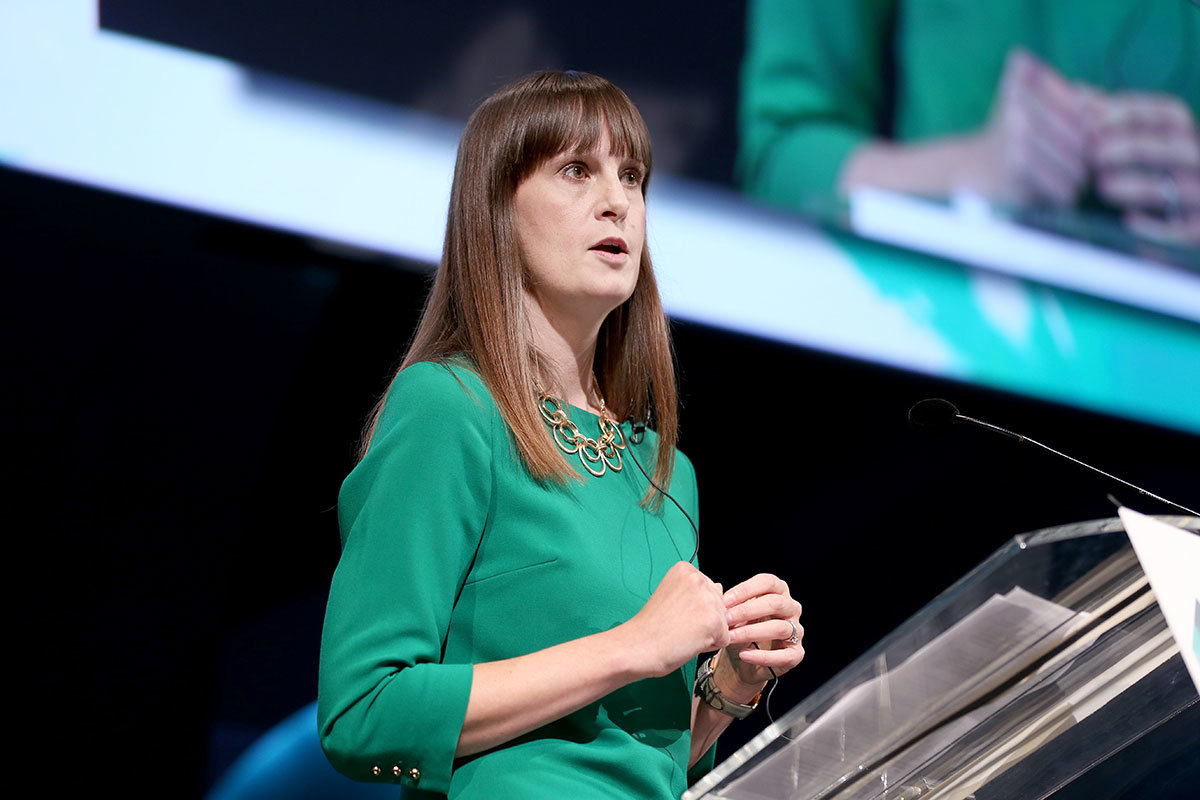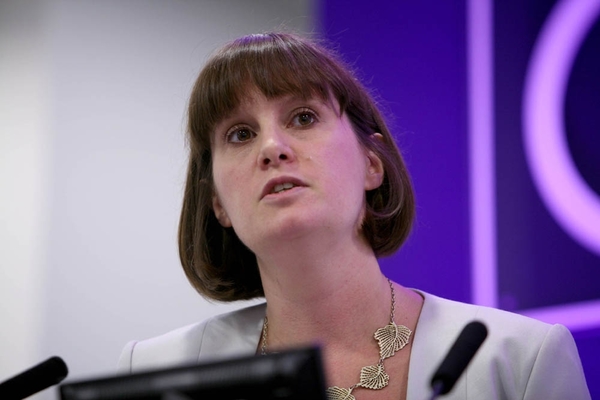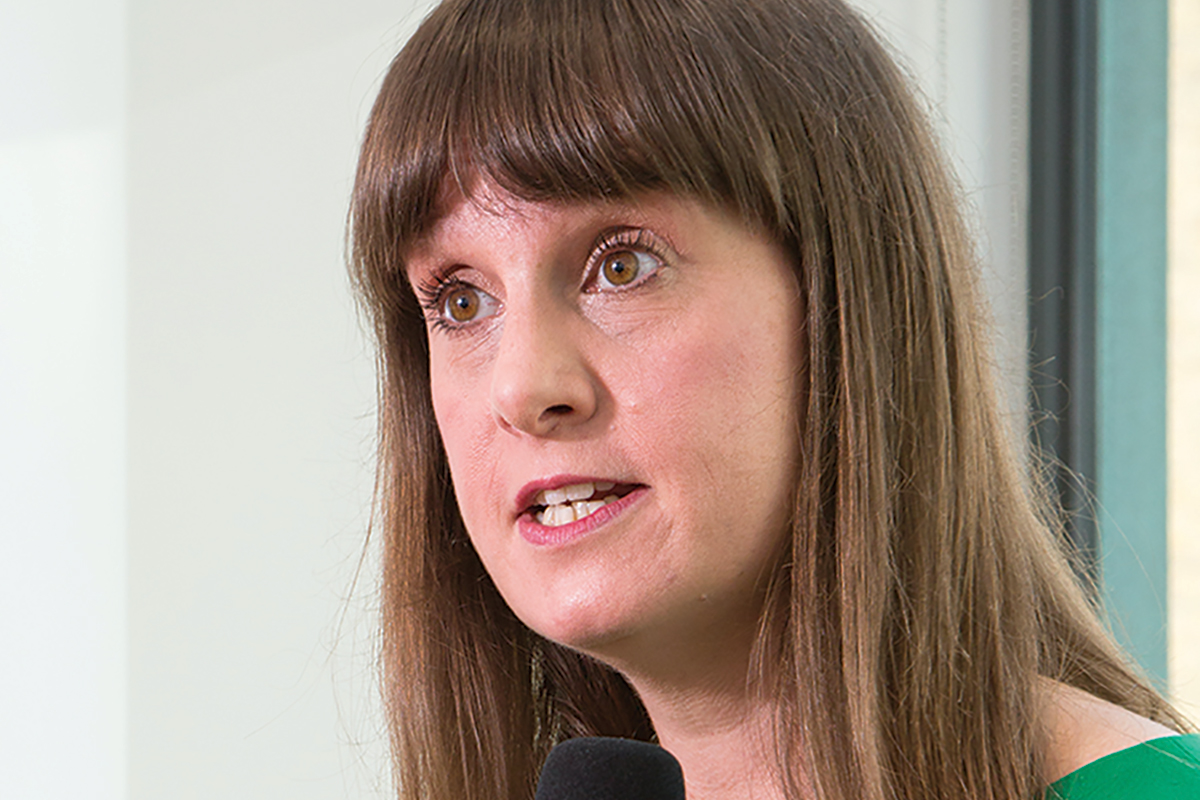You are viewing 1 of your 1 free articles
‘There’s a massive opportunity to do things differently’: Kate Henderson on taking the NHF reins
Kate Henderson is David Orr’s replacement as chief executive of the NHF. Peter Apps discovers she is not afraid to break the mould. Photography by Jonathan Goldberg
When Kate Henderson arrived at a business leadership forum in the North West of England to give the after-dinner address, three separate men asked her where the toilets were.
“When the third one asked me, I realised they thought I was a waitress,” she says.
She didn’t say anything in the moment. But after dinner, she stood up and gave a speech about devolution, regeneration and regional inequalities, and the room fell silent.
“I really knew my stuff and it was very evidence-based. At the end of it first off I had a stunned silence and then I had a round of apologies,” she says.
When Ms Henderson took the helm at the Town and Country Planning Association (TCPA) nine years ago, she was frequently forced to confront some of these attitudes: she was the first woman in its 120-year history to do the job, the youngest (aged 29) and the first non-planner.
“There was a real perception that I didn’t know anything because I was not from within the profession,” she says. This may be a pre-emptive rebuttal to any naysayers in the housing sector (should they exist).
Listen to a podcast version of this interview below:
Ms Henderson meets Inside Housing seven working days into her new role as chief executive of the National Housing Federation (NHF), having been a somewhat surprising winner of the race to succeed David Orr, the previous long-standing incumbent, as she has no previous experience working for a housing association.
She is the first woman to take the role.
But at the TCPA, she says, coming from outside planning was no disadvantage.
“It was a real gift not to be a planner, because to be able to advocate for something because you see its benefits from the outside is a really powerful thing, but also it is important to be able to communicate that in an accessible way,” she explains.
Despite not coming from a housing association, Ms Henderson is certainly not green when it comes to housing policy.
At the TCPA she established herself as a regular and leading voice on housing policy as the organisation lobbied successfully to move the concept of garden cities up the political agenda.
This has also given her plenty of experience of interacting with government.
“I’ve worked with politicians of all colours and I’ve worked with very high levels of government,” she says. “I’ve worked with select committees and I’ve run an all-party parliamentary group. I’m used to dealing with high-level politics.”
This experience will be important as NHF chief executive – an increasingly political role which carries the foremost responsibility for setting the tone of the housing association sector’s relationship with government.
Ms Henderson has inherited a relationship which is very warm – her predecessor Mr Orr endured some battles with ministers in his 15 years in the role but left on a high, with prime minister Theresa May personally attending the NHF’s annual conference to wish him well, speaking in glowing terms about the housing association sector and unveiling £2bn of long-term funding for associations.
But Ms Henderson is clear that this is not a case of ‘job done’ – making specific reference to the low numbers of social rented homes currently being built.
“Just because we’ve had some warm political announcements, and absolutely we should build on them, it doesn’t mean we have solved anything,” she says.
“We have a much firmer foundation for getting stuff done, but getting stuff done is our responsibility.
“If we look at the figures, we need 90,000 socially rented homes each year, we need 145,000 affordable homes; 340,000 homes in total and last year what did we build? There were around 5,000 socially rented homes, so to go from 5,000 to 90,000 is our challenge, it’s our opportunity.”
At the NHF, the decision of how critical of government to be is a constant political tightrope.
Too aggressive, and the door can be shut. Too much praise, and critics will howl that the organisation has lost its teeth.
Everyone in the sector has a view on how Mr Orr managed to balance this position during his 13 years at the helm.
Will Ms Henderson’s approach be different?
She is clear that she will not step back from a fight if necessary.
“We will work with government and we will work with the opposition, but ultimately for society: this is about people, this is about getting people living in better quality homes that they can afford,” she says.
“If decisions that are made by government are not going to lead to the best outcomes for our members, and ultimately society, then we have a responsibility to work with government and to change that.
“[But] sometimes there will be a red line and there will have to be a standpoint where we say: ‘I’m sorry, we do not support that, because it’s not in the interests of our members, of communities, of society’. I’m perfectly up for doing that.”
“Just because we’ve had some warm political announcements, and absolutely we should build on them, it doesn’t mean we have solved anything.”
One area where the NHF may need to negotiate with government over the coming years is the Voluntary Right to Buy (VRTB) – an agreement made in 2015 to extend Right to Buy discounts to housing association tenants.
The slow roll-out continues this month with a regional pilot in the West Midlands and the results will be watched closely.
The sector will be keenly aware that there is no money currently earmarked to pay the compensation for discounts it was promised if it is rolled out nationally.
In her prior role, Ms Henderson was a vocal critic of housing policy in the period when the Right to Buy extension was being devised.
She previously released research attacking it, warning that 90% of councils believed it would reduce social housing stocks.
Asked if she has changed her mind, she is circumspect but says the NHF would be “strong” in its response to government if it believed like-for-like replacement was not happening.
“Without a doubt the Right to Buy that was brought out in the 1980s has massively reduced the amount of social housing that is available in this country,” she says.
“I think the important thing with the [VRTB], which is a government-administered and funded scheme, is that we have to ensure we have one-for-one replacement – that is the key.
“The VRTB scheme is an opportunity for people to get on the housing ladder and I get that, but we have to keep up the pressure on supply of affordable housing and particularly around social rented homes, so we have got to make sure there is like-for-like replacement.”
In person, Ms Henderson is approachable and friendly.
She gamely tells an impromptu joke when asked, enthuses happily over her favourite garden city and treats all of our questions (both serious and light) to long and detailed answers.
She certainly has plenty to say – a couple of samples from the transcript put her at about 210 words a minute. Most people speak at somewhere between 110 and 150.
She previously worked in communications at the TCPA and has an obvious flair for expressing a message clearly and accessibly – something which undoubtedly weighed in her favour when the NHF board considered her application.
The fact that Ms Henderson is a woman in her thirties – she’s 38 – will also be welcomed by those calling for greater diversity in leadership in the housing sector, an issue which has climbed up the agenda this year and one she has previously been vocal about.
“I think there’s just a massive opportunity to do things differently,” she says of the sector’s current lack of diversity at the top.
“I have spent a lot of time working with local government, I have gone to lots of dinners, meetings, lots of events, and I am often the only woman around the table."
“And sometimes you’ll be sat there with a dozen, maybe 20, council leaders and I will be the only woman and you think: ‘Wow, you’re making these really big decisions about your local authority area and actually you all have a pretty similar viewpoint’. It’s just a missed opportunity to get people round the table.”
She adds that diversity “is not just about gender”, and is also about ethnicity, socioeconomic background and geography. “Accents matter,” she says. “It’s not to say having men who are white running organisations is a bad thing, but having a mix of people running organisations diversifies our thought leadership, which diversifies the outcomes of the decisions we make, and the decisions we make about the built environment are long-term and they need to reflect society.”
This taps into another conversation preoccupying the sector at the moment – that of tenant representation and listening to the voices of the residents.
Ms Henderson meets Inside Housing at the NHF offices in London just before she sets out on a nationwide road trip, meeting housing associations up and down the country.
“I have spent a lot of time working with local government, I have gone to lots of events, and I am often the only woman around the table.”
“In terms of my early engagement, I don’t want to just meet members in board rooms; I want to meet residents, I want to see the homes housing associations have built and hear what people think,” she says.
This focus on the tenant voice is clearly a personal priority for Ms Henderson – asked what she would consider as success in her role leading the NHF, the first thing she says is “empowered tenants, a change in conversation, which is already happening, in terms of tenants feeling really valued”. The need for change is most starkly exemplified, she says, by the lessons from the devastating Grenfell Tower fire last year.
“[When I first saw the images of the fire] I cried, I hugged my children and I watched it all night. It haunts me and I think it probably haunts everybody working in this sector,” she says. “I think one of the starkest things which came out of Grenfell and is coming out of the inquiry now is people feeling voiceless, and that can’t happen again.”
On this note, the interview comes to an end. A road trip around the country to understand this and other issues in more detail awaits.
It is the first step on the journey for the sector’s new leader, as she seeks to set a new direction for herself and the sector.












